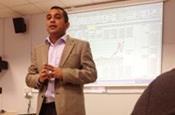Finance guru, Devraj Basu will be part of an exclusive panel debate at FinCrime Focus: Anti-Money Laundering.

A senior lecturer in finance and accounting at Strathclyde Business School, Devraj set up the Regtech Forum and Alliance which bring together industry, academia and government both within Scotland and internationally, with the goal of understanding the fast moving Regtech landscape in financial crime and money laundering.
Devraj will be leveraging his experience when he comments on the fundamentals that organisations need in place as part of an effective global AML/KYC compliance programme.
The panel debate sits within a content-rich agenda of discussions and presentations at FinCrime Focus: Anti-Money Laundering, taking place on Wednesday May 4.
The one-day livestreaming event gives global audiences a seat at the edge of the financial crime discussion, where professionals can discover actionable advice on how to tackle money laundering more efficiently and in ways that satisfy regulatory standards.
Beyond achieving compliance, effective AML/KYC programmes must be able to adapt to an ever-changing financial crime landscape. We spoke with Devraj prior to his appearance at FinCrime Focus: Anti-Money Laundering to get a snapshot of what success looks like in this rapidly-evolving industry sector.
Could you briefly outline your career path so far?
I am an academic who has recently become interested in Regtech. We started an online forum around financial Regtech which has a particular focus on AML, which is how I became interested in this area.
What are the fundamental components of an effective AML/KYC programme?
One could take a people, process, technology and data perspective on this. The data needs to be high quality and there needs to be proper data mapping processes as well as data integrity checks.
The processes and procedures around transaction monitoring need to be sufficiently risk-sensitive and robust, with scenarios and typologies tailored to the specific risks. Appropriate techniques should be used to generate typologies and all relevant individuals should be educated around these.
How can AML professionals demonstrate success and efficiency of their AML programmes?
Professionals must demonstrate appropriate coverage of relevant risks as well as awareness of emerging risks, updating typologies to adapt to these emerging risks. Programmes should respond to alerts within specified time limits with sufficient testing of these alerts. There should be clear procedures for compliance, management and communication of AML policies and procedures.
What are the primary challenges to businesses as they push to improve AML/KYC compliance?
International businesses would need to monitor their correspondent relationships, particularly relevant to banks. There needs to be regular updating of typologies corresponding to emerging risks and to changes in patterns of criminal behaviour. Communication and education are key issues to ensure that that relevant individuals are able to act swiftly and appropriately to report risks and take necessary action.

Don’t miss Devraj Basu speaking exclusively at FinCrime Focus: Anti-Money Laundering in the panel debate: “Key Elements of an Effective Global AML/KYC Compliance Programme in 2022”.
Also on the panel
- Sujata Dasgupta, Global Head - Financial Crime Compliance Advisory, Tata Consultancy Services
- Talal Shoukat, Head of Compliance & MLRO in well-reputed money services company
Session time: 13:30-14:20 PM BST
Date: Wednesday 4th May 2022





















No comments yet